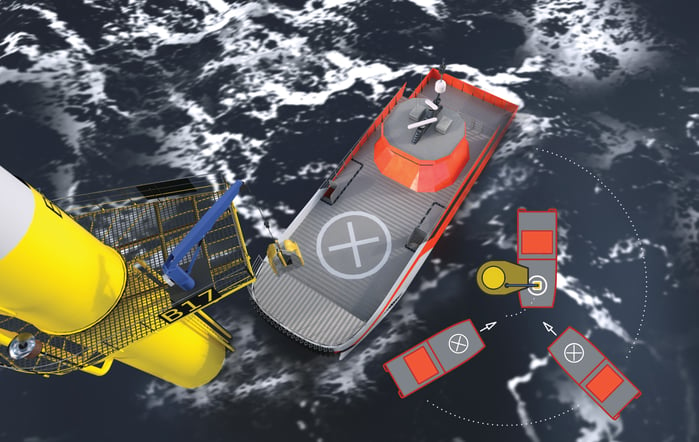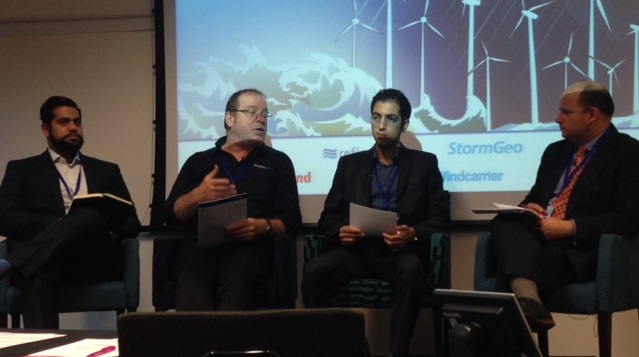Key Themes
One of the key, recurring themes at Wind Power Monthly’s Developing and Operating Further Offshore Wind Farms event, was safe personnel transfer and access.
Another was the offshore wind industry’s financial challenge to reduce its LCOE, (levelised cost of energy: the cost pMWh of energy generated by wind in comparison to that generated by other energy technologies). New products and innovations in the industry will either need to contribute to making wind energy cost-effective, or improve personnel safety.
Philip Strong, CEO of Reflex Marine, presented the companies’ new offshore wind access concept. The presentation examined the link between sea state, access system capabilities and field economics.
To download a copy of the presentation, please click here.

A FROG-XT1 being winched from a vessel. No contact between vessel and structure required. Vessel Approach and station keeping up to 300° for optimum positioning to prevalent weather.
Alternative Methods of Access
The use of helicopters and Service Operation Vessel’s for transportation and accommodation further offshore were another recurring theme, with the advantages and limitations of both being acknowledged.
Helicopters were adopted as the method of preference from the early days in Europe’s offshore industry, when marine methods were less developed. However, winch based access methods are now used widely around the world and provide a safe alternative.
Studies carried out by DNV GL indicate that winch based marine access compares very favourably to helicopter in terms of risk.

Human Factors
Personnel welfare and human factors were identified as being essential to wind farm efficiency. Wind farm operations and productivity can be monitored, but it shouldn’t be forgotten that personnel are essential to the entire operation. Personnel need to be well looked after, well rested, kept safe, and motivated in order to work productively
Making it as safe and convenient to get to work on turbines and other platforms will be a critical element of the effective operation of wind farms.
Reflex Marine’s access concept has personnel welfare at its core. The access system will increase the capabilities of developers and operators. By impacting on both wind farm safety and uptime, lost revenue can be minimised without compromising safety.

Panel discussion: The “Human Factor”: Analysing The Benefits And Limits Of Technicians Living Offshore For A Long Period Of Time. Panel includes Philip strong, CEO at Reflex Marine.
Collaboration
Vessel designs for offshore wind energy are evolving and will be key to providing safe and comfortable crew transfers. The vessel provides a vital platform for ensuring that safe transfers can take place.
Strategic partnerships with vessel, lifting companies and transfer specialists will provide operators with safe, flexible and costs effective access solutions.
If you are interested in collaborating or finding out more about this concept please get in contact by calling: +44 (0) 1872 321155, or emailing: robin.proctor@reflexmarine.com